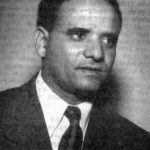 1934 – An Anglo-Ethiopian border commission in Ogaden discovers an Italian garrison in Walwal, which had entered Ethiopia. This leads to the Abyssinia Crisis. The province of Walwal, was an oasis in Ethiopia where the border clash took place in 1934 between the Kingdom of Italy and the Ethiopian Empire. Benito Mussolini used this incident as a pretext to invade Ethiopia, which led to the Second Italo-Abyssinian War. Italian troops would be withdrawn from Ethiopia 8 years later, following the entry of the British army and the return of Emperor Haile Selassie.
1934 – An Anglo-Ethiopian border commission in Ogaden discovers an Italian garrison in Walwal, which had entered Ethiopia. This leads to the Abyssinia Crisis. The province of Walwal, was an oasis in Ethiopia where the border clash took place in 1934 between the Kingdom of Italy and the Ethiopian Empire. Benito Mussolini used this incident as a pretext to invade Ethiopia, which led to the Second Italo-Abyssinian War. Italian troops would be withdrawn from Ethiopia 8 years later, following the entry of the British army and the return of Emperor Haile Selassie.
 1959 – French President Charles de Gaulle states in a speech in Strasbourg his vision for “Europe, from the Atlantic to the Urals”. His phrase, “Europe, from the Atlantic to the Urals”, has been frequently mentioned throughout the history of European integration. It became, for the next ten years, a favorite political motto of Charles de Gaulle. His vision stood in stark contrast to the Atlanticism of the United States and Britain, preferring instead a Europe that would act as a third pole between the United States and the Soviet Union.
1959 – French President Charles de Gaulle states in a speech in Strasbourg his vision for “Europe, from the Atlantic to the Urals”. His phrase, “Europe, from the Atlantic to the Urals”, has been frequently mentioned throughout the history of European integration. It became, for the next ten years, a favorite political motto of Charles de Gaulle. His vision stood in stark contrast to the Atlanticism of the United States and Britain, preferring instead a Europe that would act as a third pole between the United States and the Soviet Union.
 1963 – BBC broadcasts the first episode of An Unearthly Child (played by William Hartnell), the first story in the first Doctor Who series, which is now the longest running science fiction drama in the world. Doctor Who, is a British television program produced by the British Broadcasting Corporation, since 1963. The program describes the adventures of Lord Time called “Doctor”, an alien being, for all human appearances, from the planet Gallifrey.
1963 – BBC broadcasts the first episode of An Unearthly Child (played by William Hartnell), the first story in the first Doctor Who series, which is now the longest running science fiction drama in the world. Doctor Who, is a British television program produced by the British Broadcasting Corporation, since 1963. The program describes the adventures of Lord Time called “Doctor”, an alien being, for all human appearances, from the planet Gallifrey.
 1966 – Vincent Kassel is born in Paris. Kassel, is a well-known French actor. He first achieved his performance as a troubled French Jewish youth, in Matthieu Kassovitz’s 1995 film La Haine, for which he received two Cesar Award nominations. He gained wide recognition with the English-speaking audience for his performances in Ocean’s Twelve and Ocean’s Thirteen. Throughout his career, which spans more than three decades, Cassel has won numerous critical acclaim and awards, including a Cesar Award in 2009 and a Canadian Screen Award in 2016.
1966 – Vincent Kassel is born in Paris. Kassel, is a well-known French actor. He first achieved his performance as a troubled French Jewish youth, in Matthieu Kassovitz’s 1995 film La Haine, for which he received two Cesar Award nominations. He gained wide recognition with the English-speaking audience for his performances in Ocean’s Twelve and Ocean’s Thirteen. Throughout his career, which spans more than three decades, Cassel has won numerous critical acclaim and awards, including a Cesar Award in 2009 and a Canadian Screen Award in 2016.
 1974 – Ethiopian Prime Minister Aklilu Habte Wold is executed at the age of 62, along with 59 other politicians, ministers and senior military officials. Also known as “Black Saturday”, this massacre was orchestrated by the Ethiopian communist dictator Mengistu Haile Mariam. Habte Wold, and Mengistus political opponents were shot in Kerchele prison in Addis Ababa. This mass execution would pave the way for the period of the so-called Derg Government. The communist regime would fall from power in the early 1990s.
1974 – Ethiopian Prime Minister Aklilu Habte Wold is executed at the age of 62, along with 59 other politicians, ministers and senior military officials. Also known as “Black Saturday”, this massacre was orchestrated by the Ethiopian communist dictator Mengistu Haile Mariam. Habte Wold, and Mengistus political opponents were shot in Kerchele prison in Addis Ababa. This mass execution would pave the way for the period of the so-called Derg Government. The communist regime would fall from power in the early 1990s.
 1980 – A magnitude 7.0 earthquake shakes southern Italy’s Irpinia. During these tremors, nearly 5 thousand people were killed and over 8 thousand others were injured. The quake struck at 19:30 local time. The first injury was followed by 90 after the blow. There were three main strokes, each with epicenters in a different location, within 80 seconds. The Italian government spent 60 trillion lire on reconstruction, while West Germany and the US, together sent $ 105 million.
1980 – A magnitude 7.0 earthquake shakes southern Italy’s Irpinia. During these tremors, nearly 5 thousand people were killed and over 8 thousand others were injured. The quake struck at 19:30 local time. The first injury was followed by 90 after the blow. There were three main strokes, each with epicenters in a different location, within 80 seconds. The Italian government spent 60 trillion lire on reconstruction, while West Germany and the US, together sent $ 105 million.
 1992 – The first IBM Simon smartphone is produced. This smartphone was introduced at COMDEX in Las Vegas, Nevada. The IBM Simon Personal Communicator (simply known as IBM Simon) is a touch screen PDA designed by Machines International Business (IBM), and manufactured by Mitsubishi Electric. IBM engineer Frank Canova realized that chip-and-wireless technology was becoming small enough to be used in handheld devices. About 50,000 such copies were sold in the years to come in the United States and beyond.
1992 – The first IBM Simon smartphone is produced. This smartphone was introduced at COMDEX in Las Vegas, Nevada. The IBM Simon Personal Communicator (simply known as IBM Simon) is a touch screen PDA designed by Machines International Business (IBM), and manufactured by Mitsubishi Electric. IBM engineer Frank Canova realized that chip-and-wireless technology was becoming small enough to be used in handheld devices. About 50,000 such copies were sold in the years to come in the United States and beyond.
 2001 – The Cybercrime Convention is signed in Budapest, Hungary. This convention is the first international treaty that seeks to address the Internet and cybercrime by harmonizing national laws, improving investigative techniques, and increasing cooperation between nations. It was drafted by the Council of Europe in Strasbourg, France, with the active participation of Council of Europe observer states Canada, Japan, the Philippines, South Africa and the United States.
2001 – The Cybercrime Convention is signed in Budapest, Hungary. This convention is the first international treaty that seeks to address the Internet and cybercrime by harmonizing national laws, improving investigative techniques, and increasing cooperation between nations. It was drafted by the Council of Europe in Strasbourg, France, with the active participation of Council of Europe observer states Canada, Japan, the Philippines, South Africa and the United States.






